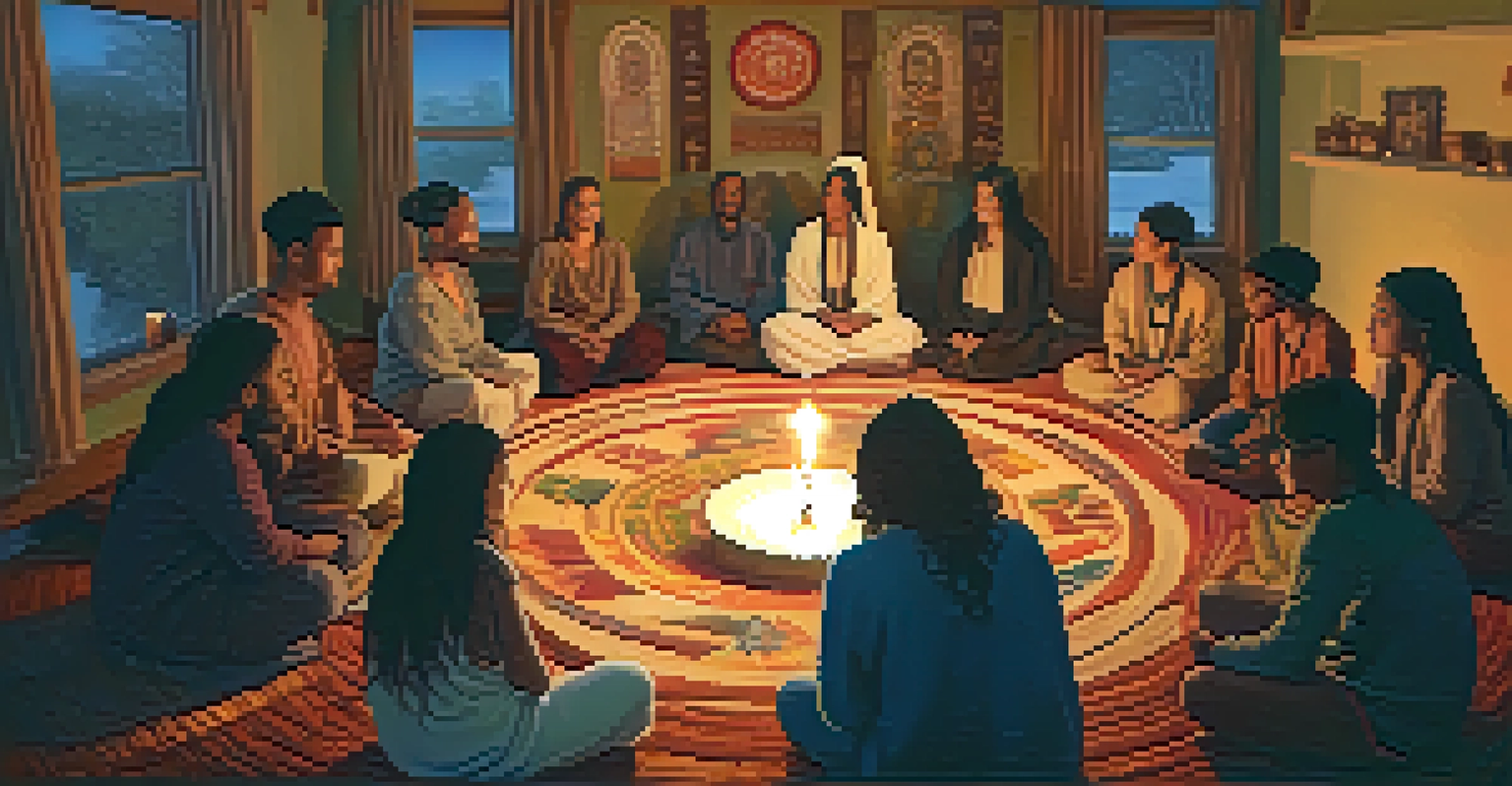Spiritual Beliefs: A Pathway to Greater Empathy for All

Understanding Spiritual Beliefs and Empathy
Spiritual beliefs often serve as a guiding compass in our lives, shaping our values and interactions. When we engage with these beliefs, we find a deeper connection to ourselves and others. This connection fosters empathy, allowing us to understand different perspectives and experiences.
The highest form of knowledge is empathy.
Consider how spiritual practices like meditation or prayer can quiet the mind and open the heart. This openness encourages us to step into someone else's shoes and appreciate their feelings. As we acknowledge our shared humanity, the barriers between us begin to dissolve.
Ultimately, spirituality invites us to recognize that we are part of something larger than ourselves. This realization can spark a compassionate response towards others, nurturing empathy that transcends cultural and social differences.
The Role of Compassion in Spiritual Practices
Many spiritual traditions emphasize compassion as a core tenet. Whether through the teachings of Buddhism or the parables of Christianity, kindness is a universal theme that resonates across cultures. Practicing compassion allows us to connect with others on a profound level.

For instance, when we participate in community service or volunteer work, we are often moved by the struggles of those we help. This shared experience can deepen our understanding and empathy. It’s a reminder that compassion isn’t just an abstract concept; it's a lived experience.
Spirituality Enhances Empathy
Engaging with spiritual beliefs fosters deeper connections with ourselves and others, nurturing empathy across diverse perspectives.
By actively engaging in compassionate acts, we not only uplift others but also enrich our own spiritual journeys. This reciprocal relationship fosters a community where empathy flourishes, creating a ripple effect that can inspire change.
Empathy as a Bridge Across Differences
Empathy acts as a bridge, connecting us across the vast landscapes of our differences. In a world filled with diverse beliefs and practices, understanding and accepting these differences is crucial. Spiritual beliefs can guide us in navigating these complexities with grace.
Compassion and tolerance are not a sign of weakness, but a sign of strength.
When we approach others with an empathetic mindset, we are more likely to engage in meaningful conversations. This willingness to listen and learn can break down stereotypes and build trust. It transforms our interactions from mere exchanges to opportunities for growth.
As we cultivate this empathy, we create spaces where everyone feels valued and heard. These connections not only enrich our own lives but also promote a culture of inclusivity and respect, essential for harmony in our diverse world.
How Spirituality Encourages Self-Reflection
Spiritual beliefs often encourage self-reflection, which is vital for personal growth. When we take time to reflect on our actions and motivations, we gain insights that can enhance our empathy towards others. This introspective process allows us to understand our biases and assumptions.
For example, journaling or engaging in contemplative practices can reveal how our backgrounds shape our perceptions. Recognizing these influences is the first step toward transforming our responses to others. As we become more aware of ourselves, we become more attuned to the feelings of those around us.
Compassion is a Core Value
Practicing compassion through spiritual traditions enriches our understanding and strengthens community bonds.
This journey of self-discovery not only fosters empathy but also strengthens our relationships. By being more mindful of our thoughts and actions, we create a more compassionate world, one interaction at a time.
The Impact of Spiritual Communities on Empathy
Spiritual communities play a significant role in nurturing empathy among their members. These gatherings often provide a safe space for individuals to share their experiences and struggles. When we listen to others’ stories, we cultivate a sense of understanding that deepens our empathy.
For instance, participating in group discussions or spiritual retreats can expose us to diverse perspectives. This shared experience fosters not only connection but also a sense of belonging. In these settings, empathy becomes a collective practice, strengthening the ties that bind us.
Moreover, the support networks formed within spiritual communities can be invaluable. They encourage us to lean on one another during challenging times, creating a culture of compassion that extends beyond the community itself.
Challenges in Practicing Empathy Through Spirituality
While spirituality can enhance empathy, there are challenges to consider. Sometimes, individuals may interpret their beliefs in ways that create division instead of connection. It’s important to recognize that empathy requires humility and openness, even when faced with differing viewpoints.
For example, the tendency to judge others based on their spiritual choices can hinder our ability to empathize. This judgment creates barriers that detract from the core values of compassion and understanding that many spiritual paths promote. We must actively work to overcome these tendencies.
Empathy Bridges Differences
Empathy serves as a bridge that connects us across diverse beliefs, fostering meaningful conversations and inclusivity.
By acknowledging these challenges, we can strive to create a more inclusive spiritual practice. Embracing the idea that empathy is an ongoing journey helps us remain open to learning from others, ultimately enriching our spiritual lives.
Practical Ways to Foster Empathy Through Spirituality
There are many practical steps we can take to foster empathy through our spiritual beliefs. Engaging in active listening during conversations is a powerful way to show understanding. This practice involves being fully present and genuinely curious about others' experiences.
Additionally, incorporating mindfulness practices can enhance our ability to empathize. Techniques like meditation or deep breathing help us stay centered, making it easier to respond with compassion. When we approach interactions with a calm mind and an open heart, empathy naturally flows.

Finally, seeking out diverse spiritual experiences can broaden our perspectives. Attending different religious services or participating in interfaith dialogues can enrich our understanding and appreciation of others. By embracing diversity, we cultivate a more empathetic worldview.